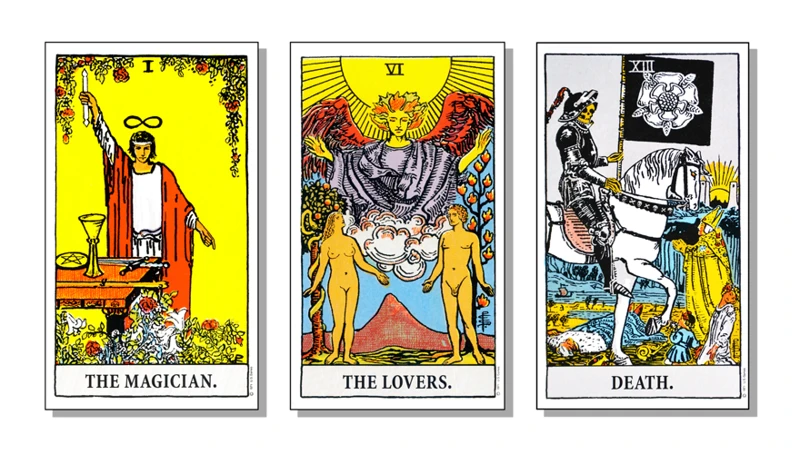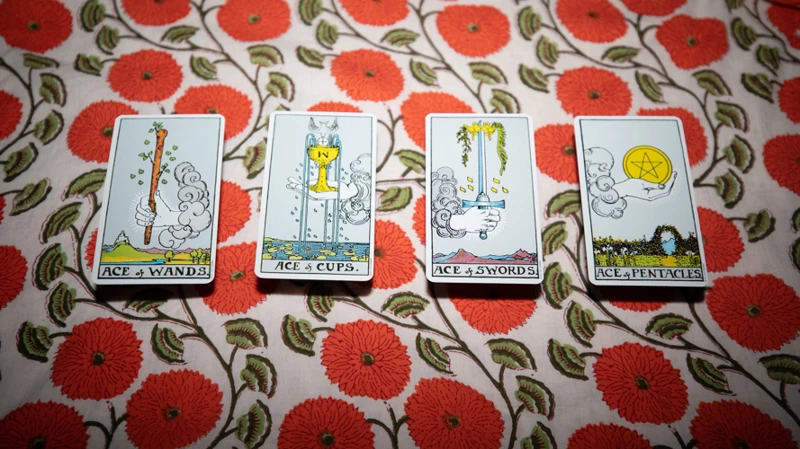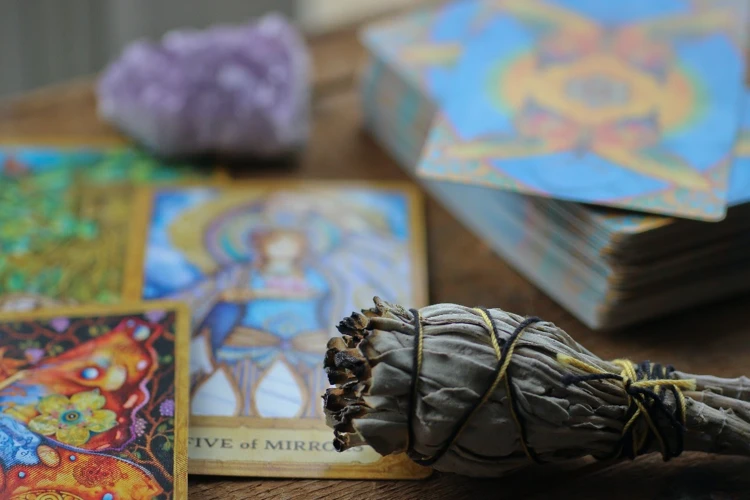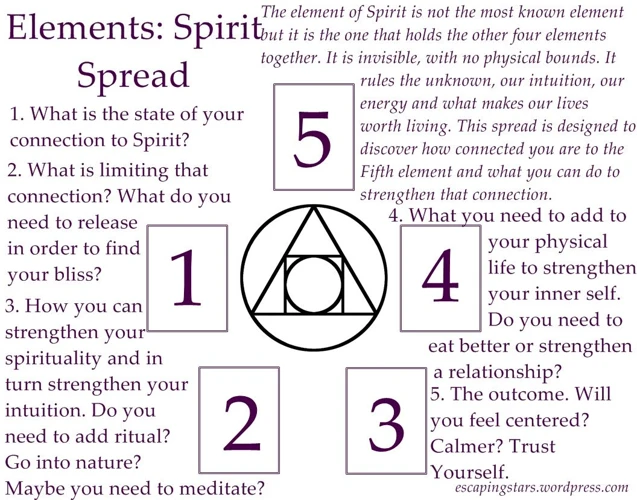Are you embarking on the exciting journey of selecting your first tarot deck? With countless options available, it’s important to consider various factors before making your decision. Factors to Consider When Selecting Your First Tarot Deck will guide you through the process step by step, ensuring that you choose a deck that aligns with your intentions, resonates with your energy, and suits your level of experience. From understanding your purpose to familiarizing yourself with different deck types, analyzing artwork and design styles, and feeling the connection with the deck, this article will provide you with valuable insights and tips. So, let’s dive in and explore the fascinating world of tarot decks!
Contents
- 1. Understand Your Intention
- 2. Familiarize Yourself with Different Tarot Deck Types
- 3. Connect with the Deck’s Aesthetics
- 4. Feel the Energy and Connection
- 5. Take Into Account Your Level of Experience
- Conclusion
-
Frequently Asked Questions
- 1. What is the significance of understanding your intention when selecting a tarot deck?
- 2. How does determining tarot deck use impact the selection process?
- 3. What are the different types of tarot decks available?
- 4. How can analyzing artwork and design style help in choosing a tarot deck?
- 5. What should be considered when evaluating the color palette and symbolism of a tarot deck?
- 6. How can visiting a local metaphysical shop assist in selecting a tarot deck?
- 7. What benefits can attending tarot fairs or expos bring when choosing a tarot deck?
- 8. How can reading reviews and recommendations assist in selecting a tarot deck?
- 9. What are some beginner-friendly tarot decks?
- 10. What are advanced tarot decks suitable for experienced readers?
- References
1. Understand Your Intention

When selecting your first tarot deck, take the time to reflect on your purpose for using tarot. Are you interested in gaining insight into your personal life, seeking spiritual guidance, or exploring your intuition? Understanding your intention will help you choose a deck that resonates with your goals. Consider whether you want a deck that focuses on traditional interpretations or one that offers a more contemporary or mystical perspective. Reflect on whether you want to use tarot for self-reflection, personal growth, or divination purposes. Having a clear understanding of your purpose will guide you in finding a deck that aligns with your intentions.
Another important aspect to consider is how you plan to use your tarot deck. Are you primarily going to use it for personal readings, or do you want to delve into professional tarot reading? Knowing this will help you choose a deck that suits your needs. If you are just starting out and primarily using the deck for personal readings, opting for a beginner-friendly deck with clear imagery and guidance may be a good choice. However, if you aspire to become a professional reader, selecting a deck that allows for in-depth exploration and interpretation may be more suitable. Determine your tarot deck use upfront to ensure that you select a deck that aligns with your goals and aspirations.
To gain a deeper understanding of different tarot deck types, click here.
Remember, your intention and tarot deck use are the foundational pillars of selecting the perfect deck for you. By reflecting on these aspects and considering your purpose and deck use, you will have a clearer vision of what you are looking for in a tarot deck.
1.1 Reflect on Your Purpose
When reflecting on your purpose for using tarot, it’s essential to delve deeper into your intentions and goals. Ask yourself questions like:
1. What do I want to gain from using tarot?
Think about the specific insights, guidance, or personal growth you hope to achieve through your tarot practice. Are you seeking clarity in certain areas of your life, such as relationships, career, or personal development? Identifying your desired outcomes will help you choose a tarot deck that aligns with your intentions.
2. How do I want to connect with the tarot?
Consider whether you resonate more with traditional interpretations, modern approaches, or specific spiritual or metaphysical practices. This will influence the type of deck you choose, as different decks may incorporate different symbolism, themes, or artistic styles that reflect certain interpretations or beliefs.
3. Am I drawn to a particular theme or spiritual path?
If you are interested in a specific spiritual path or practice, such as Wicca, astrology, or Buddhism, you may want to select a tarot deck that incorporates those elements. Some decks are designed with specific themes or spiritual traditions in mind, allowing you to deepen your connection to your chosen path.
By reflecting on your purpose for using tarot, you can narrow down the options available and find a deck that resonates with your goals and aspirations. Once you have a clear understanding of your purpose, you can explore other factors such as the influence of tarot deck publishers and the possibility of personalizing your deck. To learn more about the influence of tarot deck publishers, click here.
1.2 Determine Your Tarot Deck Use
Now that you have reflected on your purpose for using tarot, it’s time to dive deeper and determine your tarot deck use. This step will help you understand how you plan to interact with your deck and what you hope to achieve through your tarot practice.
1. Personal Readings: If your main intention is to use the tarot deck for personal readings and self-reflection, you may want to consider a deck that speaks to you on a personal level. Look for a deck that resonates with your intuitive senses, as this will enhance your connection with the cards. Beginner-friendly decks like the Rider-Waite-Smith Tarot are widely available and come with guidebooks that provide interpretations and meanings for each card.
2. Professional Reading: If you aspire to provide tarot readings professionally, you may want to choose a deck that allows for more in-depth exploration and interpretation. Professional-grade tarot decks often have complex symbolism, rich imagery, and require a deeper understanding of the tarot system. The Thoth Tarot deck, designed by Aleister Crowley, is an example of a deck that caters to professional readers with its esoteric symbolism and intricate imagery.
3. Personalized Practice: Some individuals prefer to personalize their tarot practice by creating their own deck based on their spiritual beliefs, artistic expression, or unique interpretations. This option allows for complete customization and personalization of the deck, making it a truly one-of-a-kind tool for divination. If this resonates with you, consider learning more about personalizing your own tarot deck to reflect your individuality and spiritual journey.
By determining your tarot deck use, you can now narrow down your options and select a deck that aligns with your specific needs and goals. Remember, there is no right or wrong deck to choose from – it’s all about finding the one that speaks to you and supports you on your tarot journey.
2. Familiarize Yourself with Different Tarot Deck Types

When choosing your first tarot deck, it’s important to familiarize yourself with the different types available. Each type has its own unique characteristics and interpretations that might resonate with you more than others. Here are a few popular tarot deck types to consider:
1. Rider-Waite-Smith Tarot Deck
The Rider-Waite-Smith (RWS) deck is one of the most well-known and widely used tarot decks. It features traditional symbolism and imagery, making it a great choice for beginners. The RWS deck consists of 78 cards divided into Major and Minor Arcana, each with its own meanings and interpretations.
2. Thoth Tarot Deck
The Thoth deck, created by Aleister Crowley, is known for its intricate and esoteric symbolism. It delves deeper into astrology, numerology, and Kabbalah, making it a popular choice for those interested in more advanced and mystical tarot readings.
3. Marseille Tarot Deck
The Marseille deck is one of the oldest tarot decks, dating back to the 15th century. It features simple, hand-drawn illustrations and focuses on straightforward meanings and interpretations. This deck is often favored by purists and those who appreciate the historical significance of tarot.
4. Oracle and Angel Tarot Decks
Unlike traditional tarot decks, oracle and angel decks offer a different approach to divination. They often feature uplifting and intuitive messages, making them popular for those seeking spiritual guidance and inspiration. Oracle decks can have various themes, such as nature, animals, or angels, allowing you to choose one that resonates with your interests and beliefs.
It’s important to note that these are just a few examples of tarot deck types. There is a wide range of styles, themes, and interpretations available on the market. Take the time to research and explore different tarot decks to find the one that speaks to you and aligns with your interests and intuition.
2.1 Rider-Waite-Smith Tarot Deck
The Rider-Waite-Smith Tarot Deck is one of the most well-known and widely used tarot decks in the world. Created by artist Pamela Colman Smith and published in 1910, this deck has become a classic and serves as the foundation for many other tarot decks. The imagery of the Rider-Waite-Smith deck is rich in symbolism, making it highly accessible and easy to interpret, especially for beginners. The deck consists of 78 cards, including 22 Major Arcana cards and 56 Minor Arcana cards. The Major Arcana cards depict archetypal figures and represent significant life lessons and spiritual growth. The Minor Arcana cards are divided into four suits: Wands, Cups, Swords, and Pentacles, each representing different areas of life. The Rider-Waite-Smith deck’s traditional symbolism and intuitive imagery allow for deep exploration and understanding of the tarot’s core meanings. Many tarot guidebooks and resources are specifically tailored to this deck, making it a valuable choice for those who want to dive into the tarot’s rich symbolism. If you prefer a deck with a strong foundation and rich historical significance, the Rider-Waite-Smith Tarot Deck is an excellent option to consider.
2.2 Thoth Tarot Deck
The Thoth Tarot Deck, created by Aleister Crowley and illustrated by Lady Frieda Harris, is a powerful and symbolically-rich deck that is steeped in esotericism and occult influences. This deck is based on the teachings of the Hermetic Order of the Golden Dawn and incorporates elements of astrology, Qabalah, and alchemy. Each card in the Thoth Tarot Deck is an intricate masterpiece, with vibrant colors and detailed imagery that invite deep contemplation.
The Thoth Tarot Deck consists of 78 cards, including 22 Major Arcana cards and 56 Minor Arcana cards. The Major Arcana cards in this deck deviate from traditional tarot symbolism but still carry significant meaning. They are rich in symbolism and can sometimes be challenging to interpret for beginners. The Minor Arcana cards follow the traditional suits of Wands, Cups, Swords, and Disks, but feature unique artwork and symbolic elements that enhance the overall mystical vibe of the deck.
One aspect that sets the Thoth Tarot Deck apart is its emphasis on the spiritual journey and personal transformation. The deck encourages introspection and delving into the depths of one’s psyche. It is often favored by those with a keen interest in esoteric studies or individuals who resonate with the mystical and occult realms.
It’s important to note that due to its complex symbolism and deep esoteric roots, the Thoth Tarot Deck may not be the most suitable choice for beginners. However, for those who are drawn to its mystique and are willing to invest time and effort into understanding its intricacies, this deck can be a valuable tool for self-discovery and spiritual exploration.
Whether you are studying the symbolism of the Thoth Tarot Deck for personal growth or incorporating it into your professional tarot readings, its unique and enigmatic nature is sure to captivate and inspire.
2.3 Marseille Tarot Deck
The Marseille Tarot Deck is one of the oldest and most traditional tarot decks available. It originated in the 18th century in France and is known for its simple, bold, and abstract artwork. The Marseille Tarot Deck typically consists of 78 cards, divided into major and minor arcana. The major arcana cards feature iconic imagery such as The Fool, The Magician, and The World, while the minor arcana cards depict suits of Cups, Swords, Coins, and Batons, each with their own symbolism.
What sets the Marseille Tarot Deck apart is its focus on numerology and elemental associations. The numbered cards in each suit correspond to specific values and interpretations, allowing for a deeper exploration of numerological meanings in readings. Additionally, the Marseille Tarot Deck does not offer detailed illustrations on the minor arcana cards, making it a deck that relies heavily on the reader’s ability to interpret the cards based on their knowledge of the traditional meanings.
While the Marseille Tarot Deck may be appealing to those who appreciate historical significance and simplicity, it may not be the best choice for beginners or those who prefer decks with intricate artwork and detailed imagery. However, for those interested in diving into the roots of tarot and exploring the traditional symbolism associated with the Marseille Tarot Deck, this deck can offer a rich and profound tarot reading experience.
The Marseille Tarot Deck is a classic and traditional tarot deck that is steeped in history and offers a focus on numerology and elemental associations. Its simple artwork and reliance on traditional meanings make it a suitable choice for those who prefer a more stripped-down tarot experience. However, it may not be the ideal deck for beginners or those seeking decks with elaborate illustrations and symbolism.
2.4 Oracle and Angel Tarot Decks
When exploring different tarot deck types, it’s important to consider oracle and angel tarot decks. While these decks are often grouped together, they each have their own unique characteristics. Oracle decks are not bound by traditional tarot structures and can vary in the number of cards and themes. They offer a more intuitive and freeform approach to divination, allowing you to tap into your own inner wisdom. Oracle decks often feature uplifting and empowering messages, making them suitable for self-reflection and personal growth.
On the other hand, angel tarot decks specifically focus on connecting with angelic energies and guidance. These decks often include beautiful angelic imagery and symbols, and they can provide gentle and supportive messages. Angel tarot decks are perfect for those seeking spiritual guidance, comfort, and connection with the angelic realm. They can be particularly helpful for individuals who resonate with angelic energy or have a deep interest in angelic spirituality.
When considering oracle and angel tarot decks, take the time to explore different options and find a deck that resonates with you. Pay attention to the artwork, symbolism, and overall energy of the deck. Consider whether the messages and themes align with your spiritual beliefs and personal preferences. Ultimately, the deck you choose should inspire and uplift you, allowing you to connect with your intuition and divine guidance.
Remember, oracle and angel tarot decks offer unique experiences and can be a wonderful addition to your tarot journey. Whether you are drawn to the intuitive nature of oracle decks or the angelic energies of angel tarot decks, both can provide valuable insights and guidance on your spiritual path.
3. Connect with the Deck’s Aesthetics

When selecting a tarot deck, it’s important to connect with the aesthetics of the deck. The artwork and design style should resonate with you on a visual and intuitive level. Analyzing the artwork can provide insight into the interpretations and energy of the deck. Take time to consider the overall theme of the deck – whether it’s traditional, whimsical, abstract, or modern. Some decks may feature intricate and detailed illustrations, while others may have simpler and more minimalist designs. Reflect on your personal preferences and what draws you in visually.
Color palette and symbolism are also crucial factors to consider. Colors can evoke specific emotions and set the mood for a reading. Pay attention to the color choices in the deck and how they make you feel. Symbolism is another important aspect to consider, as different decks may incorporate various symbols, imagery, and cultural references. Symbols can enhance the meanings of the cards and add layers of depth to your readings. Consider whether you feel a connection to the symbols used in the deck and if they resonate with your personal beliefs and interpretations.
As you explore different tarot decks, take the time to analyze the artwork and design style. Trust your intuition and choose a deck that visually speaks to you and aligns with your personal aesthetic preferences. Remember, the connection with the deck’s aesthetics is an essential part of your tarot journey, as it will inspire and enhance your readings.
To read more about tarot deck aesthetics and the influence of publishers, click here.
3.1 Analyze the Artwork and Design Style
When selecting a tarot deck, it is essential to analyze the artwork and design style to ensure it resonates with you. Tarot decks come in a variety of artistic styles, ranging from bold and vibrant to intricate and symbolic. Consider the following factors when analyzing the artwork and design style of a deck:
1. Visual Appeal: Evaluate whether the artwork visually appeals to you. Do you prefer decks with realistic imagery, abstract art, or something more whimsical? Choose a deck that aligns with your personal aesthetic preferences.
2. Symbolism: Dive deeper into the symbols and imagery used in the deck. Do they resonate with your understanding of tarot and the meanings associated with the cards? Look for symbolism that speaks to you and sparks your intuition.
3. Clarity and Readability: Assess the clarity and readability of the artwork. Are the images clear and easy to interpret? Can you distinguish the different elements of each card without confusion? Opt for a deck with artwork that allows for intuitive interpretation.
4. Cultural Representation: Pay attention to the cultural representation within the artwork. Some decks may draw inspiration from specific cultures or traditions. Consider whether you resonate with the cultural elements portrayed in the deck.
5. Artistic Technique: Appreciate the artistic technique used in the deck. Does it showcase the artist’s skill and creativity? Look for decks that demonstrate a level of artistry that captivates and inspires you.
6. Consistency: Consider whether the artwork and design style remain consistent throughout the entire deck. Consistency can help create a cohesive and harmonious reading experience.
Take your time to explore different tarot decks and analyze their artwork and design styles. It’s helpful to view sample images or browse through the actual cards if possible. By carefully considering these factors, you’ll be able to find a deck that visually resonates with you, ignites your intuition, and enhances your tarot reading experience.
3.2 Consider Color Palette and Symbolism
When selecting a tarot deck, it’s essential to consider the color palette and symbolism used in the artwork. The colors and symbols in a deck can greatly influence the way you connect with the cards and interpret their meanings.
Start by analyzing the color palette of the deck. Take note of the predominant colors and how they make you feel. Different colors evoke different emotions and energies. For example, vibrant and bold colors may stimulate creativity and passion, while softer pastel shades can evoke a sense of calm and tranquility. Choose a color palette that resonates with you and aligns with the energy you want to bring into your tarot practice.
In addition to color, symbolism plays a significant role in tarot decks. Symbols serve as visual cues that convey specific meanings and interpretations. Pay attention to the symbols used in the deck and how they relate to traditional tarot symbolism. Does the deck incorporate traditional tarot symbols like the Chariot, the High Priestess, or the Hierophant? Or does it feature unique and unconventional symbols?
Consider what the symbols mean to you personally and how they align with your own beliefs and understanding. Symbols can be interpreted differently by different individuals, so it’s essential to choose a deck that speaks to you on a symbolic level.
To help in your decision-making process, create a checklist or use a comparison table to assess the color palette and symbolism of different tarot decks. This will allow you to visually compare decks side by side and make an informed choice based on your preferences. Remember, the color palette and symbolism are important aspects to consider to ensure that the deck resonates with your energy and enhances your tarot readings.
4. Feel the Energy and Connection

When selecting a tarot deck, it’s important to feel a strong energy and connection with the cards. Here are a few ways to help you gauge this connection:
Visiting a local metaphysical shop that carries a variety of tarot decks can be a great way to physically connect with different decks. Holding the cards in your hands and flipping through them can give you a sense of how the deck feels and if it resonates with you. Pay attention to how the cards shuffle, their weight, and the overall energy you feel when handling them.
Tarot fairs or expos often have vendors showcasing a wide selection of tarot decks. Attending such events allows you to not only see the decks in person but also interact with them. Take your time to explore different decks, ask questions from the sellers, and see if any particular deck catches your eye or resonates with you energetically.
Reading reviews and recommendations about different tarot decks can be a helpful way to gather insights from others who have already used them. While everyone’s experience will vary, paying attention to common themes or feedback can give you an idea of why certain decks may be popular or why they may resonate with others. Look for reviews that focus on the energy or intuitive connection with the cards.
Remember, the connection with your tarot deck should feel personal and authentic to you. It’s not just about the aesthetics or popularity of a deck, but rather how it speaks to your intuition and inner voice. Trust your instincts and allow yourself to be drawn to a deck that feels right for you.
4.1 Visit a Local Metaphysical Shop
When it comes to selecting your first tarot deck, visiting a local metaphysical shop can be a wonderful opportunity to connect with the energy of different decks. These specialized stores often have a wide selection of tarot decks available, allowing you to physically browse through them, hold them in your hands, and examine the artwork up close. This tactile experience can give you a better sense of the deck’s energy and aesthetics. Additionally, the staff at metaphysical shops are usually knowledgeable about tarot and can provide guidance and recommendations based on your preferences and intentions.
When visiting a local metaphysical shop, keep the following tips in mind:
1. Ask for assistance: Don’t hesitate to ask the store staff for help. They can offer insights on different decks, provide recommendations based on your level of experience, and answer any questions you may have.
2. Take your time: Allow yourself ample time to explore and handle various decks. Pay attention to how each deck feels in your hands and whether the artwork and symbolism resonate with you.
3. Trust your intuition: As you browse through the decks, trust your gut feelings. If a particular deck catches your attention or gives you a positive vibe, it may be a good indication that it’s the right choice for you.
4. Seek variety: Explore decks from different tarot traditions, art styles, and themes. This will broaden your perspective and help you discover what truly resonates with you.
Visiting a local metaphysical shop can be a delightful and immersive experience that allows you to physically connect with the decks. It gives you the opportunity to explore various options, ask questions, and make an informed decision based on your intuition and preferences. So, take a stroll to your nearest metaphysical shop and embark on your tarot deck search journey
4.2 Attend Tarot Fairs or Expos
Attending tarot fairs or expos can be a fantastic way to explore and connect with different tarot decks. These events bring together tarot enthusiasts, readers, and vendors who offer a wide variety of decks for you to explore and purchase. When you attend a tarot fair or expo, you have the opportunity to browse through numerous decks, examine the artwork, and even have a hands-on experience with the cards. This immersive experience allows you to get a feel for the energy and connection you have with a particular deck.
One of the advantages of attending tarot fairs or expos is that you can interact directly with the vendors and deck creators. You can ask them questions about the deck’s concept, symbolism, or intended use. They may even offer demonstrations or mini-readings to showcase the strengths and uniqueness of their decks. It’s also a great opportunity to meet fellow tarot enthusiasts and share experiences, recommendations, and insights.
To make the most of your experience at tarot fairs or expos, it can be beneficial to plan ahead. Research upcoming events in your area or consider traveling to larger tarot conventions. Make a list of the specific decks or publishers you want to explore and prioritize your time accordingly. Take notes, compare different decks, and ask for recommendations from vendors or other attendees. Consider bringing a trusted tarot guidebook or a notebook to capture your thoughts and impressions.
Attending tarot fairs or expos provides a hands-on experience that allows you to immerse yourself in the world of tarot decks. It’s an excellent opportunity to connect with the energy of the cards, interact with vendors and creators, and gather valuable insights and recommendations. So, mark your calendar and make plans to attend a tarot fair or expo near you, and embark on an exciting journey of discovering the perfect tarot deck for you.
If you want to read more about how to feel the energy and connection with a tarot deck, check out the section on 4.1 Visit a Local Metaphysical Shop.
4.3 Read Reviews and Recommendations
When it comes to selecting your first tarot deck, reading reviews and seeking recommendations from other tarot enthusiasts can be immensely helpful. Hearing about others’ experiences with specific decks can provide valuable insights and guidance. Start by exploring online forums, tarot communities, and social media groups dedicated to tarot. Look for discussions and reviews on popular tarot decks. Pay attention to the feedback and experiences shared by others. You may find that certain decks resonate more with beginners, while others are favored by experienced readers.
Create a list of decks that catch your interest based on the reviews and recommendations you come across. Note down the positive aspects that reviewers highlight, such as the deck’s artwork style, clarity of symbolism, or depth of interpretations. Consider any potential drawbacks mentioned as well. Reading a variety of reviews will allow you to gather a balanced perspective on different decks and make an informed decision.
Additionally, don’t hesitate to seek recommendations from friends or fellow tarot enthusiasts who have experience with tarot decks. Their first-hand insights and guidance can be invaluable in narrowing down your options. Take note of any specific decks they suggest and ask them about their personal experiences with those decks. Remember, everyone’s preferences and interpretations can vary, so take recommendations as a starting point rather than the final decision.
By reading reviews and seeking recommendations, you can gather a wealth of information and feedback about various tarot decks. This will help you make an informed decision and choose a deck that resonates with you. Remember to trust your intuition and consider the alignment of the deck with your intentions, as well as your personal aesthetic preferences.
5. Take Into Account Your Level of Experience
When selecting your first tarot deck, it’s crucial to take into account your level of experience. Tarot decks vary in complexity, symbolism, and interpretation, so choosing a deck that matches your skill level is key to a successful and fulfilling tarot practice.
For beginners, it’s advisable to start with decks that are specifically designed to be beginner-friendly. These decks often have clear and straightforward imagery, accompanied by guidebooks or keywords that help with interpretation. Beginner decks typically follow well-known tarot systems, such as the Rider-Waite-Smith or Marseille, making it easier to learn and understand the cards’ meanings. Some popular beginner-friendly decks include the Rider-Waite Tarot and the Aquarian Tarot.
If you have some experience with tarot reading, you might be ready to explore more advanced decks that offer greater depth and complexity. Advanced tarot decks may have unique artistic styles, symbolism, or alternative interpretations of the cards. These decks require a deeper understanding of tarot symbolism and the ability to connect intuitively with the imagery. Examples of advanced tarot decks include the Thoth Tarot or the Hermetic Tarot.
Ultimately, your level of comfort and familiarity with tarot should be the determining factor in selecting a deck. Take the time to assess your knowledge and skill level, and choose a deck that challenges you without overwhelming you. Remember that tarot is a lifelong journey of learning and growth, so starting with a deck that matches your experience level will enhance your enjoyment and development as a tarot reader.
5.1 Beginner-Friendly Decks
When you’re new to tarot, selecting a beginner-friendly deck can make your journey easier and more enjoyable. Beginner-friendly decks are designed with simplicity and clarity in mind, making them ideal for those who are just starting to explore tarot reading. These decks typically have clear imagery, intuitive symbolism, and guidebooks or companion resources that provide explanations and interpretations of the cards. Beginner-friendly decks often follow the traditional Rider-Waite-Smith structure, which is widely recognized and used as a foundation for learning tarot. They help beginners understand the basic meanings of the cards and develop their reading skills gradually. Some popular beginner-friendly decks include the Rider-Waite Tarot Deck, the Morgan-Greer Tarot Deck, and the Golden Universal Tarot Deck. These decks provide solid foundations for beginners to build upon as they deepen their tarot practice and explore more advanced interpretations. If you’re new to tarot, a beginner-friendly deck can be a great starting point to develop your understanding and connection with the cards.
5.2 Advanced Tarot Decks
When you have gained some experience and feel ready to explore deeper levels of tarot interpretation, advanced tarot decks can provide you with more complex symbolism and nuanced meanings. These decks are designed for experienced readers who are familiar with tarot traditions and comfortable with the depth and complexity they offer.
Advanced tarot decks often incorporate esoteric and occult symbolism, delving into mystical practices, astrology, alchemy, and deeper spiritual concepts. They may feature intricate artwork with rich details that require careful study and contemplation. These decks can be a valuable tool for readers who want to delve into more profound levels of divination and personal exploration.
Some popular examples of advanced tarot decks include the “Thoth Tarot Deck” and “The Hermetic Tarot.” These decks draw inspiration from esoteric traditions and incorporate the teachings of renowned occultists like Aleister Crowley and the Hermetic Order of the Golden Dawn. While these decks can be challenging to interpret, they provide a wealth of knowledge and wisdom for those willing to explore their depths.
Selecting an advanced tarot deck is a personal choice that depends on your level of experience and your desire to dive into the complexities of tarot. These decks are not recommended for beginners, as they may overwhelm or confuse those who are not yet familiar with the core meanings and symbolism of tarot. As you progress in your tarot journey and gain confidence in your readings, you can consider upgrading to an advanced deck that resonates with your interests and spiritual path.
Keep in mind that advanced tarot decks require time, dedication, and study to fully grasp their intricate symbolism and meanings. They can be a rewarding and enlightening tool for experienced readers who are ready to take their tarot practice to the next level.
Conclusion
In conclusion, selecting your first tarot deck is an exciting and personal journey. By understanding your intention and tarot deck use, familiarizing yourself with different deck types, connecting with the deck’s aesthetics, feeling the energy and connection, and considering your level of experience, you can make an informed decision that resonates with you. Remember that your tarot deck should reflect your unique personality, beliefs, and desires, as well as provide the guidance and inspiration you seek. Whether you are drawn to the classic symbolism of the Rider-Waite-Smith deck, the esoteric wisdom of the Thoth deck, the traditional Marseille deck, or the intuitive messages of oracle and angel decks, the choice is ultimately yours. Don’t be afraid to explore different options, visit local metaphysical shops, attend tarot fairs or expos, and read reviews and recommendations to help inform your decision. With the right tarot deck in hand, you’ll be ready to embark on a profound and transformative journey into the world of tarot.
Frequently Asked Questions
1. What is the significance of understanding your intention when selecting a tarot deck?
Understanding your intention helps you choose a tarot deck that aligns with your goals and resonates with your energy. It ensures that the deck you select will support your purpose, whether it’s personal growth, spiritual guidance, or intuitive exploration.
2. How does determining tarot deck use impact the selection process?
Determining your tarot deck use helps you find a deck that suits your needs. If you plan to use it for personal readings, you may prefer a beginner-friendly deck. If you aspire to become a professional tarot reader, you may opt for a more in-depth and versatile deck.
3. What are the different types of tarot decks available?
There are several types of tarot decks, including Rider-Waite-Smith, Thoth, Marseille, and Oracle and Angel decks. Each deck has its unique characteristics, symbolism, and interpretations, offering diverse perspectives on tarot reading.
4. How can analyzing artwork and design style help in choosing a tarot deck?
Analyzing the artwork and design style of a tarot deck allows you to connect with the imagery and symbolism presented. It helps you resonate with the visual aesthetic and ensures that the deck’s visuals speak to you on an intuitive level.
5. What should be considered when evaluating the color palette and symbolism of a tarot deck?
The color palette and symbolism of a tarot deck can play a significant role in the interpretation and energy of the readings. Consider whether the colors and symbols evoke the emotions and meanings that align with your understanding and intuition of tarot.
6. How can visiting a local metaphysical shop assist in selecting a tarot deck?
Visiting a local metaphysical shop allows you to physically connect with different tarot decks. You can explore the decks, shuffle the cards, and see which one feels right for you. The tactile experience helps you build a personal connection with the deck.
7. What benefits can attending tarot fairs or expos bring when choosing a tarot deck?
Tarot fairs or expos provide an opportunity to explore a wide range of tarot decks from various publishers and artists. You can interact with experts, attend workshops, and gain insights into different decks, helping you make an informed decision based on firsthand experiences.
8. How can reading reviews and recommendations assist in selecting a tarot deck?
Reading reviews and recommendations from tarot enthusiasts can provide valuable insights into the deck’s quality, usability, and alignment with different reading styles. It can help you make an informed decision by learning from the experiences of others.
9. What are some beginner-friendly tarot decks?
Beginner-friendly tarot decks often have clear imagery and guidebooks that offer straightforward interpretations. Some popular options for beginners include the Rider-Waite-Smith deck, the Radiant Rider-Waite deck, and the Tarot of the Cat People.
10. What are advanced tarot decks suitable for experienced readers?
Advanced tarot decks are often more complex and offer deeper symbolism and interpretations. Examples of advanced decks include the Thoth Tarot deck, the Crowley-Harris Thoth Tarot, and the Tarot of the Divine.






